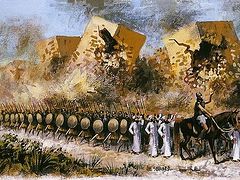There is no shortage of people who ask: “Where is your God? Why is there so much evil in the world?” And so on. The list of these questions is very old yet rather limited in number. It is hard to invent anything new on this subject.
Where is the God of judgment? people asked in the days of the Prophet Malachi. There is an exact quotation in which we can easily recognize our times as well:
Ye have wearied the Lord with your words. Yet ye say, Wherein have we wearied Him? When ye say, Every one that doeth evil is good in the sight of the Lord, and He delighteth in them; or, Where is the God of judgment? (Mal. 2:18).
And here is the prayer of the Prophet Jeremiah, who complains, saying:
Behold, they say unto me, Where is the word of the Lord? Let it come now (Jer. 17:15).
“They” are impudent disputers, who have no faith but do have insolence and a wild boldness against all that is holy. If a prophet says to them, “Reform lest you perish,” they will reply:
There is no hope: but we will walk after our own devices, and we will every one do the imagination of his evil heart (Jer. 18:12).
Clothes, means of transportation, along with some other things in the spheres of everyday life, entertainment and communications have, unarguably, changed since the time of Jeremiah; as for human hearts, the situation is “critical but stable”, as doctors say in some sad cases.
The heart is deceitful above all things, and desperately wicked: who can know it? (Jer. 17:9).
Holy King David, who was wondrous among the saints and a teacher of prayer, had to spend his entire life in a toxic atmosphere filled with godless questions as well:
Many there be which say to my soul, There is no help for him in God (Ps. 3:3).
They “say to his soul”—that is, they not only strike his ears but above all penetrate into the depths of his soul, lacerating his heart and tormenting him with doubts. In those days, David obviously resisted by vigils and long prayers. In other words, he did the things that pious monks do in our days, fighting with thoughts as with wild beasts day and night.
My tears have been my meat day and night, while they continually say unto me, Where is thy God? (Ps. 41:4).
We also see from the Psalms and the Book of Joel that in the days of humiliation of Israel it was customary among the pagans to ask mockingly: Where is their god? (see Ps. 78:10 and Joel 2:17). That is a widespread kind of scoffing at the faithful against the background of the prevailing unrighteousness. Likewise, the Babylonians demanded to hear the songs of the Hebrews who were being taken captive: Sing us one of the songs of Zion (Ps. 136:3).
In a word, if you often hear derisive questions, born in frivolous hearts, know that it is a standard and recurrent phenomenon in spiritual life. All the time keep in mind that Jeremiah is alive, while his adversaries given to mockery died an eternal death; David is holy, while his opponents were scattered by the wind in all directions like dust. The Prophet Malachi, with whose citation I began this piece, said directly:
And the Lord hearkened, and heard it [blasphemy and the voices of unbelief.—Auth.], and a book of remembrance was written before Him for them that feared the Lord, and that thought upon His name (Mal. 3:16).
Eventually the day will come when everybody without exception will discern a clear difference between the righteous and the wicked, between him that serveth God and him that serveth Him not (Mal. 3:18).
Let our readers not be confused by an abundance of Biblical citations in this text. I have done it intentionally. It would be advisable to open the mentioned books in the places indicated and familiarize yourselves with their contents.
The Bible hasn’t yet become a “desk reference” for all Orthodox Christians. Therefore, it hasn’t yet become a sharpened sword, a burning torch and a healing remedy. We can still repeat the words of St. John Chrysostom that “ignorance of the Bible results in great evils”, and we are personally to blame for this temporary triumph of evil because of voluntary ignorance.
Furthermore, let nobody think that these words concern only Old Testament times. We have quite a few cranks who believe that Christians don’t need the Old Testament. There are even odder people who claim that these are just “Jewish tales” that have nothing to do with us. But in that case the incarnate Lord and the Kingdom He has given to us would be a mere “Jewish tale” that has nothing to do with all the eccentrics who think in this way. The great Paul, who labored in the field of preaching more than all the other apostles, addresses these individuals. He says of the Old Testament books:
For whatsoever things were written aforetime were written for our learning, that we through patience and comfort of the Scriptures might have hope (Rom. 15:4).
Besides, the things that took place in earlier times are being repeated today. The prophets were asked: “Where is your God?” “Where is the Word of God?” “Where is the God of judgment?” The apostles were asked similar questions. For instance, Peter writes:
There shall come in the last days scoffers, walking after their own lusts, and saying, Where is the promise of His Coming? For since the fathers fell asleep, all things continue as they were from the beginning of the creation (2 Pet. 3:3-4).
Doing this, such people as if hurry the Lord towards His Last Judgment, as if saying: “Hasten! Come here! Fulfil what Thou Thyself promised right away!”
As if they were ready for the Judgment! As if they won’t blaze up like torches on the day of reckoning! As if they won’t cry out to the mountains and stones in that hour:
Fall on us, and hide us from the face of Him that sitteth on the Throne, and from the wrath of the Lamb: For the great day of His wrath is come; and who shall be able to stand? (Rev. 6:16-17).
They, the impertinent, are unaware that the Lord is not slack concerning His promise, as some men count slackness; but is longsuffering to us-ward, not willing that any should perish, but that all should come to repentance (2 Pet. 3:9).
The struggle for faith is the most important struggle. Everything else directly depends on victory or defeat in this war. As Paul said:
But if any man draw back, my soul shall have no pleasure in him. But we are not of them who draw back unto perdition; but of them that believe to the saving of the soul (Heb. 10:38-39).
That is why we must come to love the Holy Scriptures and firmly believe them without any doubts.
For the vision is yet for an appointed time, but at the end it shall speak, and not lie: though it tarry, wait for it; because it will surely come, it will not tarry (Hab. 2:3).




